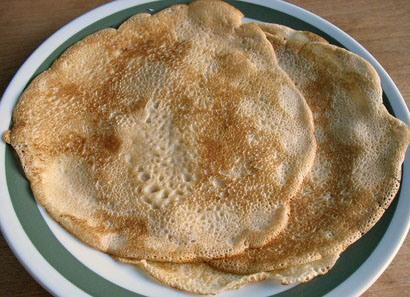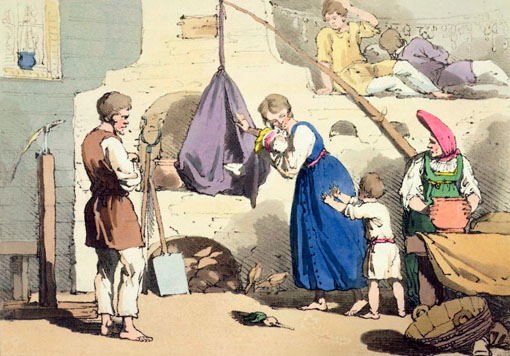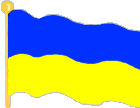Пішла мати на село
(Pishla maty na selo)
This is a Ukrainian folk song and dance. It's also known as Гречаники (Hrechanyky) "Buckwheat Panakes" (Blinis). "Hrechanyky" were traditionally made with buckwheat flour, yeast and eggs and baked in a Russian oven.
You can find the pronunciation in the notes.

Пішла мати на село
(Pishla maty na selo)
Mother Went to the Village
Folk Song
Folk Song
(Ukrainian)
(English)
Пішла мати на село
Ґречну муку добувати,
Гречаники учиняти,
Своїх діток годувати.
Приспів:
Гоп, мої гречаники,
Гоп, мої білі,
Чогось мої гречаники
На скорині сіли.
Гоп, мої гречаники,
Гоп, мої смачні,
Чогось мої гречаники
Не вдалися вдачні.
Молов батько, не віявши,
Пекла мати, не сіявши,
З помийниці воду брала,
Гречаники учиняла.
Приспів
"Іди, старий, до криниці,
Іди за водою,
А ми зварим обідати
Удвох із кумою".
Приспів
Зараз кашу без пшона,
Без солі зварила,
І без хліба татусенька
Їсти посадила.
Приспів
Сидить тато в кінці стола,
Опустивши вуха,–
Усякому так буває,
А хто жінок слуха.
Приспів
Mother went to the village
To get buckwheat flour,
To make buckwheat pancakes
To feed her babies.
(Chorus)
Hop, my pancakes
Hop, my white ones,
I don't know why
My pancakes won't rise.
Hop, my pancakes
Hop, my delicious ones
I don't know why
My pancakes aren't good.
My father was grinding, without thinking,
My mother was baking, without sowing,
She was taking water from the fountain
To cook pancakes.
(Chorus)
"Go old man, to the well,
Go get water
And we'll cook dinner
Together with the missus."
(Chorus)
I prepared the porridge without wheat
Cooked without salt,
And I set up my father
To eat, without bread.
(Chorus)
Dad's sitting at the end of the table
Lowering his head*
It happens to everyone
Who listens to women.
(Chorus)
Notes
*Literally "ears"
Pronunciation
(By Google)
Pishla maty na selo
Grechnu muku dobuvaty,
Hrechanyky uchynyaty,
Svoyikh ditok hoduvaty.
Pryspiv:
Hop, moyi hrechanyky,
Hop, moyi bili,
Chohos' moyi hrechanyky
Na skoryni sily.
Hop, moyi hrechanyky,
Hop, moyi smachni,
Chohos' moyi hrechanyky
Ne vdalysya vdachni.
Molov bat'ko, ne viyavshy,
Pekla maty, ne siyavshy,
Z pomyynytsi vodu brala,
Hrechanyky uchynyala.
"Idy, staryy, do krynytsi,
Idy za vodoyu,
A my zvarym obidaty
Udvokh iz kumoyu".
Zaraz kashu bez pshona,
Bez soli zvaryla,
I bez khliba tatusen'ka
Yisty posadyla.
Sydyt' tato v kintsi stola,
Opustyvshy vukha,–
Usyakomu tak buvaye,
A khto zhinok slukha.

Comments
There are several versions of this song.
The tune to this song was used for the Yiddish song called, "Hop! Mayne homentashn".
According to Wikipedia, "Blinis were considered by early Slavic people in pre-Christian times to be a symbol of the sun, due to their round form. They were traditionally prepared at the end of winter to honor the rebirth of the new sun (Butter Week, or Maslenitsa, also called "butter week" or "pancake week"). This tradition was adopted by the Orthodox church and is carried on to the present day. Drochena, a kind of blini, was also served at wakes to commemorate the recently deceased."
In the illustration on this page you can see a Russian Oven. They were used traditionally for heating houses in Ukraine, Russia and Belarus. People also sleep on them for heat. The oven is also used for cooking, to bake food like pancakes or pies. They give the food a distinctive flavor.

Thanks!
Thanks!
Thanks and Acknowledgements
Translated by Lisa Yannucci. Many thanks to Slavik Kitaigorodski for his French translation.
Illustration by Джон Огастес Аткинсон (John Augustus Atkinson; 1775 - 1830), etched by the artist, published 1803.
Дякую
(Dyakuyu)

























